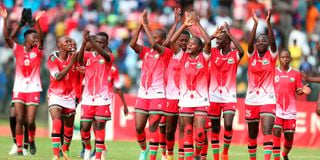Premium
Focus on girls’ professional qualities, not looks

Junior Starlets players after their victory over Burundi in a Fifa U-17 Women World Cup qualifiers on June 16, 2024 at Ulinzi Sports Complex.
What you need to know:
- I’ve never heard anyone refer to Harambee Stars as “handsome boys” in an introduction.
- Warembo when used in reference to a team is an example of benevolent sexism.
Before I proceed, can someone, preferably in his communications department, take Waziri Ababu Namwamba’s hand, lead him to one of the black leather seats in his office, the cushy black three-seater, sit him down and tell him slowly and in a calm voice to stop referring to the Junior Starlets team as “warembo”?
‘Mrembo’ Swahili word for ‘beautiful woman.’ Certainly beauty is a wonderful and even desirable human quality, especially for women and girls, but in such a context the word is problematic because the CS uses it in a gendered way.
I’ve never heard anyone refer to Harambee Stars or the junior cadres of men’s national team as “handsome boys” in an introduction, and my hunch is that it is because such a word does not signify professional approval.
When we use descriptors like “beautiful” or “lovely,” for women, it doesn’t suggest competence, effectiveness, or drive. In fact, words like these may actually imply the opposite.
Benevolent sexism
Would you rather be lovely or powerful? Lovely or authoritative? Lovely or knowledgeable?
Catch my drift?
In case you don’t, I am saying that to compliment a women’s team, especially such a high achieving one, you shouldn’t focus on looks.
“Warembo” when used in reference to a team that has earned the country a maiden World Cup appearance, is an example of benevolent sexism because it reinforces gender biases that have been deeply embedded in the sports ecosystem for centuries.
We are telling the girls that their beauty is their most important asset, and overlooking their unique strengths, skills, talents and abilities.
You may think you’re being nice by using such a word, but the underlying message is that women have a traditional place, and should stay in it.
Unique strengths
Instead, the focus should be on the girls’ professional qualities. Issue genuine praise for their unique strengths and qualities such as hard work, creativity on the pitch or resilience. This will help build the team's confidence without contributing to an atmosphere of gender bias.
That said, let’s give some flowers to former Football Kenya Federation president Uncle Sam Nyamweya.
Well, perhaps we should change his title from ‘uncle’ to ‘prophet’ because about a decade ago, he foretold that the women’s national football team would go to the World Cup before the men, a prophecy that has come to pass.
Nyamweya made those remarks at a time when, just like now, the football landscape in the country was in shambles and World Cup qualification was the preserve of some European and West African nations. Harambee Stars, we have done our part, please return the favour soon!





